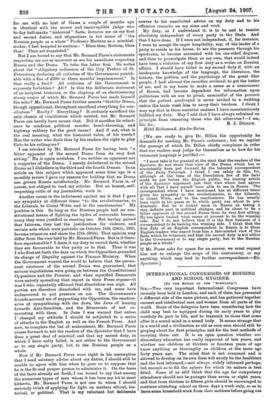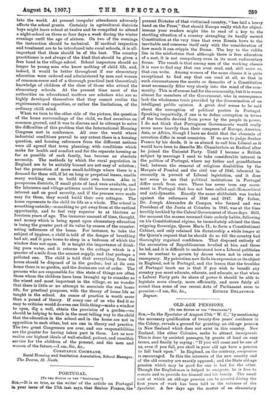INTERNATIONAL CONGRESSES OF HOUSING AND SCHOOL HYGIENE.
LTO THE EDITOR OF THE " SP ROTATOR:1
SIR,—Two very important International Congresses have recently been held in London, and each of them has presented a different side of the same picture, and has gathered together earnest and intellectual men and women from all parts of the world. Some of the delegates have been considering how the child may best be equipped during its early years to play worthily its part in life, and to transmit to those that come after it a sound mind in a sound body. It seems strange that in a world and a civilisation as old as ours men should still be groping about for first principles, and for the best methods of carrying them out. It is an open question whether our elementary education has really improved of late years, and whether our children at thirteen or fourteen years of age know anything as thoroughly as children at the same age forty years ago. The mind that is not crammed and is allowed to develop on its own lines will surely be the healthiest and the best informed,—not always widely informed perhaps, but enough so to fill the sphere for which its nature is best fitted. Some of us still think that the age for compulsory attendance should not be younger than seven or eight years, and that from thirteen to fifteen girls should be encouraged to continue attending school on three days a week only, so as to learn some household work from their mothers before going out
into the world. At present irregular attendance adversely affects the school grants. Certainly in agricultural districts boys might leave school at twelve and be compelled to attend a night-school on three or four days a week during the winter evenings until the age of sixteen. On two of the evenings the instruction should be technical. If medical inspection and treatment are to be introduced into rural schools, it is all- important that these should be of the beat. The country practitioner is not always of the kind that should be given a free hand in the village school. School inspectors should no longer be young men who know nothing of child life, and, indeed, it would be better throughout if our elementary education were ordered and administered by men and women of common-sense and of a thorough practical (not theoretical) knowledge of children of the class of those who attend the elementary schools. At the present time most of the authorities on educational matters are scholars who are so highly developed themselves that they cannot realise the requirements and capacities, or rather the limitations, of the ordinary child mind.
When we turn to the other side of the picture, the question of the home surroundings of the child, we find ourselves on common ground, and it was to discuss and to attempt to solve the difficulties of this problem that the International Housing Congress met in conference. All over the world where industrial conditions prevail to any extent there is a housing question, and housing reformers from the different nations were all agreed that town planning, with conditions which make for health and comfort and for the separate housing as far as possible of each family, has become an absolute necessity. The methods by which the rural population in England are to be suitably housed are not easy of solution ; but the promotion of more small-holdings where there is a demand for them will, if let on long or perpetual leases, enable many working men to build their own homes. Also in prosperous districts, if small plots of land were available, and the labourers and village artisans could borrow money at low interest and on good security, and if the process were made easy for them, they' would build their own cottages. The home represents to the child its life as a whole. The school is something outside,—something to get away from at the earliest opportunity, and to feel very superior to at thirteen or fourteen years of age. The immense amount of time, thought, and money which is being spent upon elementary education is losing the greater part of its value by reason of the counter- acting influences of the home. For instance, to take the subject of hygiene, a child is told of the danger of breathing bad air, and it goes home to sleep in a bedroom of which the window does not open. It is taught the importance of drink- ing pure water, and it returns to the cottage which is a quarter of a mile from the nearest supply-, and that perhaps a polluted one. The child is told that everything from the house should be disposed of in the garden ; but at its own home there is no garden, and the drains are out of order. The persons who are responsible for this state of things are often those whom the children have been brought up to consider as the wisest and moat important in the village, so no wonder that there is little or no attempt to associate the real home life, for practical purposes, with the theory of home life as taught in the school. An ounce of practice is worth more than a pound of theory. If every one of us who find it so easy to criticise would do even one little thing—make a window to open, dig a well, obtain the provision of a garden—we should be helping to teach in the most telling way to the child that the education in the school and in the home are not in opposition to each other, but are one in theory and practice. The two great Congresses are over, and our responsibilities are the greater for having taken part in them. Let us now realise our highest ideals of well-studied, patient, and unselfish service for the children of the present, and the men and women of the future.—I am, Sir, &c.,
CONSTANCE COCHRANE, Rural Housing and Sanitation Association, School Manager. The Downs, St. Neots.



































 Previous page
Previous page